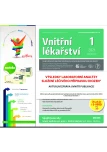-
Medical journals
- Career
Competence and informed consent
Authors: Adam Doležal; Tomáš Doležal
Authors‘ workplace: Ústav státu a práva AV ČR, v. v. i., Praha 1
Published in: Vnitř Lék 2021; 67(1): 49-55
Category:
Overview
The issue of a patient´s competence is often solved in practice without a major theoretical concept. Such an approach, focused only on the basis of intuitions and experiences of physicians, however, may lead in some cases to an inadequate assessment of competence of a particular patient. Ultimately, it can happen that the decision of an incompetent person will be respected or that the decision of the competent person will be disrespected. Both possibilities can have ethical as well as legal consequences. This article addresses both theoretical and practical issues of competence in adult patients.
Keywords:
autonomy – beneficence – Bioethics – competence – informed consent
Sources
1. Grisso T, Appelbaum, PS. Assessing competence to consent to treatment: A guide for physicians and other health professionals. Oxford University Press: New York 1998. ISBN -13 978-0-19-510372-4.
2. Faden RR, Beauchamp TL. A history and theory of informed consent. Oxford University Press: New York 1986. ISBN 01-950-3686-7.
3. President’s Commission for the Study of Ethical Problems in Medicine and Biomedical and Behavioral Research. Making Health Care Decisions: A Report on the Ethical and Legal Implications of Informed Consent in the Patient - Practitioner Relationship, Volume One: Report. 1982. [cit. 2020-09-17] Dostupné z WWW:.
4. Payne J. Lze určit kompetenci nemocného? Čas. Lék. čes. 2004; 6 : 405–407.
5. Šimek J. Lékařská etika. Praha: Grada Publishing 2015. ISBN 978-80-247-5306-5.
6. Pražák J, Novotný F, Sedláček J. Latinsko -český slovník. A -K. Praha: Státní pedagogické nakladatelství1955.
7. Beauchamp TL, Childress JF Principles of biomedical ethics. Oxford University Press: New York 2009. ISBN 978-0-19-533570-5
8. Chow GV et al. CURVES: A Mnemonic for Determining Medical Decision -Making Capacity and Providing Emergency Treatment in the Acute Setting. CHEST 2010; 137(2): 421–427.
9. Culver C, Gert B. Philosophy in Medicine. Oxford University Press: New York 1982. ISBN 978-0195029796.
10. Lavický, P. et al. Občanský zákoník: komentář. C.H. Beck: Praha 2015. ISBN 978-80-7400-529-9.
11. White, BC. Competence to consent. Georgetown University Press: Washington, D.C. 1994. ISBN 978-087-8405-596.
12. Buchanan AE, Brock DW. Deciding for others: the ethics of surrogate decisionmaking. Cambridge University Press: New York 1989. ISBN 05-213-1196-9.
13. Janofsky JS, McCarthy RJ, Folstein MF. The Hopkins Competency Assessment Test: A Brief Method for Evaluating Patients‘ Capacity to Give Informed Consent. Hosp Community Psychiatry 1992; 43(2): 132–136.
14. Etchells EE, et al. Assessment of Patient Capacity to Consent to Treatment. J Gen Intern Med. 1999; 14(1): 27–34.
15. Office of the Public Guardian. Mental Capacity Act Code of Practice. Code of practice giving guidance for decisions made under the Mental Capacity Act 2005. 2013. [cit. 2020-09-17] Dostupné z WWW: .
16. Ekström LW. Alienation, Autonomy and the Self. Midwest Studies in Philosophy 2005; 29 (1): 45–67.
17. Jonsen AR, Siegler M, Winslade WJ. Klinická etika: praktický přístup k etickým rozhodnutím v klinické medicíně. Stanislav Juhaňák – Triton: Praha 2019. ISBN 978-80-7553-653-2.
18. Savulescu J, Momeyer RW. Should informed consent be based on rational beliefs? J Med Ethics 1997; 23(5): 282–288.
19. Cutter MAG, Shelp EE. Competency. A Study of Informal Competency Determinations in Primary Care. Springer: Dordrecht 1991. ISBN 978-0792313045.
20. Kennedy I et al. Principles of medical law. Oxford University Press: Oxford (UK) 1998. ISBN 978-0198258087.
21. Katz J. The silent world of doctor and patient. Johns Hopkins University Press: Baltimore 2002. ISBN 08-018-5780-5.
22. Berg JW, Appelbaum PS. Informed consent: legal theory and clinical practice. Oxford University Press: New York 2001. ISBN 978-0195126778.
23. Weithorn LA, Campbell SB. The Competency of Children and Adolescents to Make Informed Treatment Decisions. Child Dev. 1982; 53(6): 1589–1598.
24. Lidz CW et al. Barriers to Informed Consent. Annals of Internal Medicine 1983; 99(4): 539–543.
25. Drane JF. The Many Faces of Competency. Hastings Cent Rep 1985; 15(2): 17–21.
26. Doležal A. Dříve vyslovená přání (Advance Directives). Právní a etické úvahy. Časopis zdravotnického práva a bioetiky 2017; 7(2): 1–15.
Labels
Diabetology Endocrinology Internal medicine
Article was published inInternal Medicine

2021 Issue 1-
All articles in this issue
- What internist can do for the patient after the ischemic stroke
- Long-term ECG monitoring
- Patent foramen ovale from the point of view of interventional cardiology
- Follow‑up care after COVID-19 and its related concerns
- Early and concurrent therapy of dyslipidemia and hypertension: when to start it and how to maintain patient´s good and long-term adherence?
- EMPEROR reduced – empagliflozin in patients with heart failure and reduced ejection fraction
- Current view on hepatitis B diagnosis and therapy
- Fatal coincidence of inapparent SARS‑CoV-2 infection and drug toxicity in the field of immunosuppression in a 33-year old woman
- Overlap syndrome SLE – ANCA associated vasculitis
- Diagnostic hospitalizations before patient inclusion on the waiting list for kidney transplantation
- A comprehensive interdisciplinary view at the Return to Sport after COVID-19 infection
- Pitfalls of solving polypharmacy problems
- Taxane‑induced polyneuropathy – current possibilities of prediction and management
- Fever of unknown origin
- Nutritional support in the early stage of critical illness – focused on energy and protein intake
- Competence and informed consent
- Internista a pacient po ischemické CMP
- Komentáře k analýze složení směsi flavonoidů v tabletách Diozen 500 mg metodou UHPLC
- Prof. MUDr. Jiří Vítovec, CSc., FESC, má jubileum
- Jubileum prof. MUDr. Vlastimila Ščudly, CSc.
- Is autoimmune pancreatitis a risk factor for pancreatic adenocarcinoma?
- Internal Medicine
- Journal archive
- Current issue
- Online only
- About the journal
Most read in this issue- Fever of unknown origin
- Long-term ECG monitoring
- Follow‑up care after COVID-19 and its related concerns
- Overlap syndrome SLE – ANCA associated vasculitis
Login#ADS_BOTTOM_SCRIPTS#Forgotten passwordEnter the email address that you registered with. We will send you instructions on how to set a new password.
- Career

